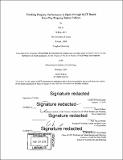| dc.contributor.advisor | David Geltner and Alex van de Minne. | en_US |
| dc.contributor.author | Li, Fan,S. M.Massachusetts Institute of Technology. | en_US |
| dc.contributor.other | Massachusetts Institute of Technology. Center for Real Estate. Program in Real Estate Development. | en_US |
| dc.coverage.spatial | a-ja--- | en_US |
| dc.date.accessioned | 2020-03-09T18:25:37Z | |
| dc.date.available | 2020-03-09T18:25:37Z | |
| dc.date.copyright | 2019 | en_US |
| dc.date.issued | 2019 | en_US |
| dc.identifier.uri | https://hdl.handle.net/1721.1/124037 | |
| dc.description | Thesis: S.M. in Real Estate Development, Massachusetts Institute of Technology, Program in Real Estate Development in conjunction with the Center for Real Estate, 2019 | en_US |
| dc.description | Cataloged from PDF version of thesis. | en_US |
| dc.description | Includes bibliographical references (page 52). | en_US |
| dc.description.abstract | This thesis constructed unlevered pure-play property return indices based on stock prices of Real Estate Investment Trusts (REITs) in Japan. These indices are developed as a prototype of a new type of tool to track unlevered property investment performance by property usage type (sector) and geographical region. In the process of constructing the pure-play indices, this thesis is innovative in applying a structural time series trend approach, in addition to the traditional least squares approach. From the indices, we are able to identify that properties held by J-REITs properties achieve higher returns, as evaluated by the stock market, compared with non-REIT-held properties, as evaluated by the private property market. This result is aligned with our observation of the advantage of J-REITs in acquiring properties that are newly developed, of better quality, or located in submarkets with higher demand; as well as possibly superior REIT management of property operation and maintenance. The sector-region segments that achieved higher return are also identified through these indices. By comparing the unlevered pure-play indices with the repeat sales based private property return indices, this thesis found that the price discovery process occurs in the public market (J-REIT market) in Japan, that is, major market turning points appeared first in the stock market based valuations, later echoed in the private market prices. However, unlike other countries that have been previously studied, the stock market based real estate valuations in Japan displayed a smaller downturn during the Global Financial Crisis. This would be consistent with J-REIT investors being more disciplined facing downturns, more focused on the long run value of the properties compared to private property market investors. | en_US |
| dc.description.statementofresponsibility | by Fan Li. | en_US |
| dc.format.extent | 52 pages | en_US |
| dc.language.iso | eng | en_US |
| dc.publisher | Massachusetts Institute of Technology | en_US |
| dc.rights | MIT theses are protected by copyright. They may be viewed, downloaded, or printed from this source but further reproduction or distribution in any format is prohibited without written permission. | en_US |
| dc.rights.uri | http://dspace.mit.edu/handle/1721.1/7582 | en_US |
| dc.subject | Center for Real Estate. Program in Real Estate Development. | en_US |
| dc.title | Tracking property performance in Japan through REIT-based pure-play property return indices | en_US |
| dc.type | Thesis | en_US |
| dc.description.degree | S.M. in Real Estate Development | en_US |
| dc.contributor.department | Massachusetts Institute of Technology. Center for Real Estate. Program in Real Estate Development | en_US |
| dc.contributor.department | Massachusetts Institute of Technology. Center for Real Estate | |
| dc.identifier.oclc | 1102320871 | en_US |
| dc.description.collection | S.M.inRealEstateDevelopment Massachusetts Institute of Technology, Program in Real Estate Development in conjunction with the Center for Real Estate | en_US |
| dspace.imported | 2020-03-09T18:25:37Z | en_US |
| mit.thesis.degree | Master | en_US |
| mit.thesis.department | RED | en_US |
